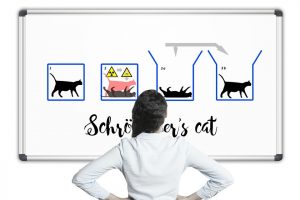In January this year, I became painfully aware of the strange limbo existence between finishing research and finishing my PhD. I had a clear vision of my ready thesis in my head, yet I had nothing concrete to show for it. In a way, my PhD seemed at the same time finished and nonexistent – kind of like Schrödinger’s fabled cat.

It is a uniquely stressful stage of the PhD journey, knowing that you are almost done, but at the same time facing possibly the biggest challenge along the way: convincing others that your work is worthwhile. Writing the actual dissertation is a rollercoaster ride on its own. The euphoria of finishing this chapter, that idea, the whole manuscript, is contrasted by the complete panic slowly setting in regarding whether your supervisors will reject your ideas, whether the pre-examiners will dismiss the whole as complete nonsense, and whether you have actually achieved anything in the past four years or so. Luckily for us in IB at TSE, we have an amazing support system. Our supervisors are brilliant, encouraging, and supportive, our colleagues are amazingly helpful, and our fellow doctoral candidates a constant source of peer support. It is the community around us that gives us hope in times of despair and lifts us even higher in times of triumph. And that support, in my experience, has become increasingly important in the final stages of the doctoral journey.
When I had just begun my research, I certainly thought about when I might finish up, when I might have my public defense, and how it might feel. But as these things creep closer, I am constantly finding new things to worry about, new steps along the way. From writing down four years’ worth of learning and ideas to handing the manuscript in, from how to type the manuscript to which printer to choose, the final stage of the doctoral journey is a mix of academia and bureaucracy. It is a blessing, if during that time there is also something else to occupy the excruciating times of waiting to hear the verdict.
For me, an exceptionally useful and pleasurable diversion was the Three Minute Thesis competition. I had thought about entering the year before but struggled to pinpoint what I wanted to tell the audience. And I was right to do so: I believe this exercise is most beneficial when you already have a grasp of what your findings are. During the 3MT coaching sessions I learned many useful tips on how to make your message compelling, be it at a pep rally or an academic conference. I quite like the idea that even as academics attending conferences where people presumably share our ideas and interests, we should aim to provide our viewpoint in a clear, concise, and engaging manner. Moreover, it is likely much easier and takes way less preparation for most academics to speak about their research for an hour than for three minutes. Therefore, I encourage everyone, doctoral candidate or professor, to try to fit your passion into three minutes of speech. I promise you there will be several benefits; really getting to know what the key points in your message are, understanding what you yourself are most excited about, and finding out your own strengths and weaknesses in speaking to large audiences.
I am happy to say that for me, 3MT was a success. In a competition designed to measure your skills in pitching, the audience voted my pitch their favorite. As the whole point of the competition is engaging the audience, I secretly (well, not so secretly anymore) kind of consider this the first prize, whatever the judges have to say. Check out my pitch below and stay tuned to see me sweat at my public defense in the autumn. Could this stage be called Doctor in spe in spe – in the hope of being in the hope of becoming a Doctor?
A news from UTU webpage of the final: Tiina Lehtiniemi voitti 3MT-kilpailun.
Riikka Harikkala-Laihinen
Doctoral Candidate
Recent Comments